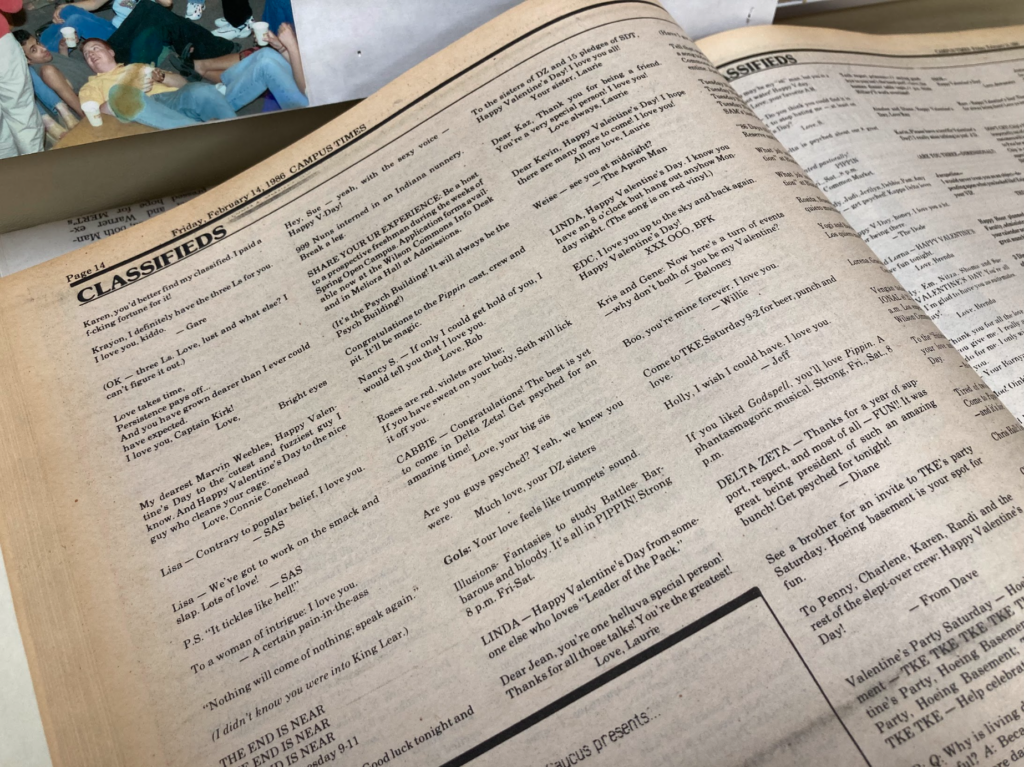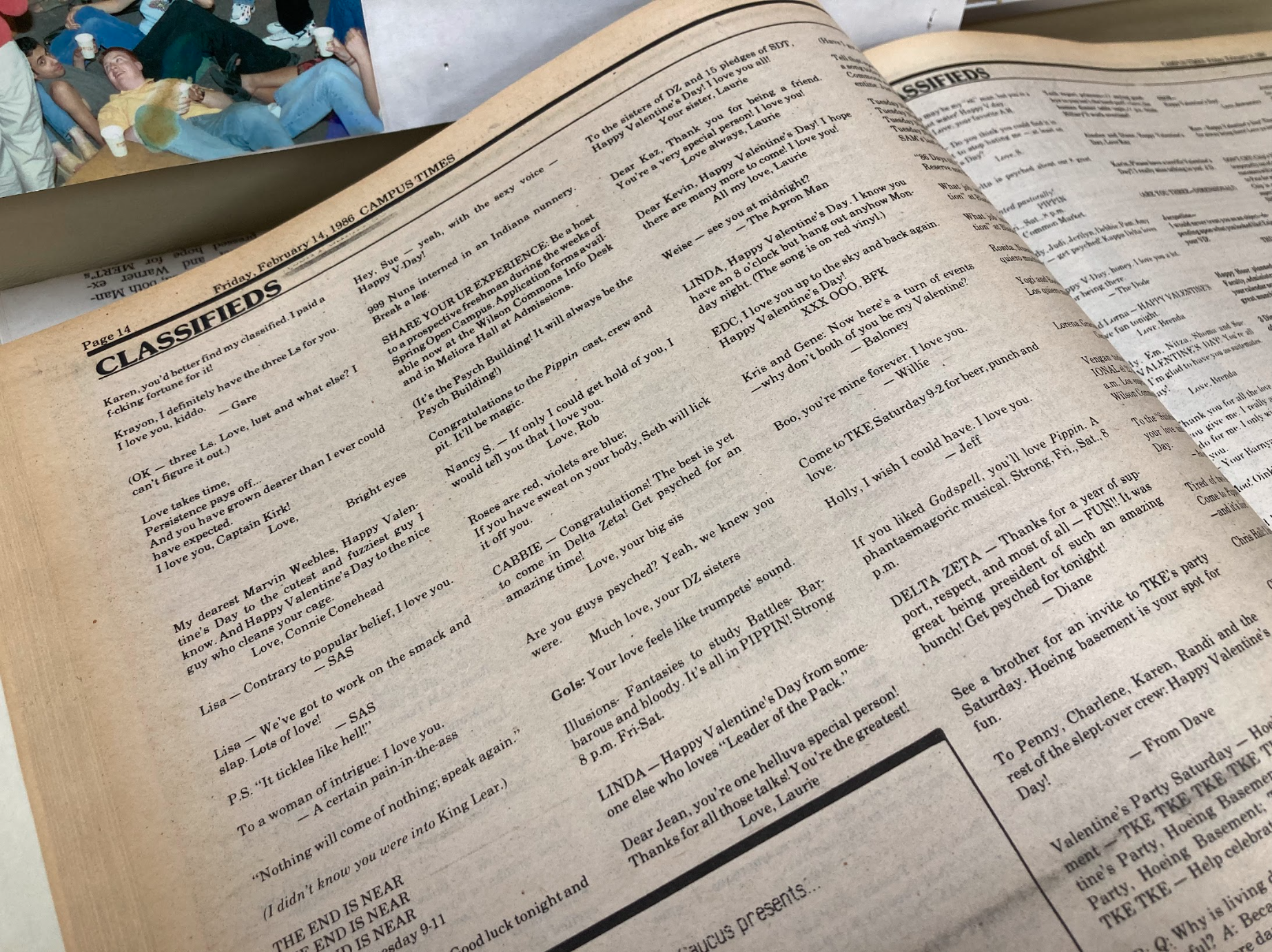We have entered an age where “soft launches” cause an uproar and relationships are kept under wraps. Relationships seem to be kept increasingly more private.
As Taylor Swift sang in her song “Peace,” “All these people think love’s for show / But I would die for you in secret.” In the modern world, the need for romantic privacy is a common desire.
In 2023, there isn’t a desire to publicize our more intimate affairs – a stark contrast from the climate of the 70s and 80s at the University. The “Classified” section proves just how public students were with their affection. This need to publicize one’s relationships and yearning is most visible in the culture of the section.
The “Classified” section in a newspaper traditionally displays text-based ads sold by word count or lines. They are usually paid for by individuals rather than businesses. However, the Campus Times’ “Classified” section evolved from the traditional paid advertisements for lost objects and listings in one centralized location to a section more closely resembling Twitter, consisting of jokes between friends played out on a public feed. The section eventually evolved to become an essential part of Valentine’s Day on campus.
Throughout the 70s and 80s, the “Classified” section in the Campus Times became a vital part of the socialization and relationships of students on campus.
The “Classified” section made its first appearance in an ad on Sept. 26, 1961. Ads under the “Classified” label appeared sporadically for the next several years until finally gaining a recurring weekly labeled section starting Feb. 3, 1968. Occasionally, throughout the earlier editions of the “Classified” section, there was a subsection labeled “Personals” categorizing the listings.
Throughout the decade, you can see hints of the larger impact the “Classified” section would have had in the University community, with one of the earliest editions including a Valentine’s Day-related note. Among the few job listings and lost ads, we see an occasional inside joke directed at a friend– some that make you wonder how they got approved.
See:
“WOULD YOU BLOW a goat for a million dollars?” (February 14, 1973)
“SPINACH DOESN’T make it happen anymore – You need vitamins and protein. Tell ’em Wimpy sent you.” (February 14, 1973)
These ads cost $0.50 for 15 words, and an additional $0.50 per each additional word, all for the satisfaction of the writers’ friends. These types of messages littered the section throughout its time in the Campus Times making this section gain popularity.
The section expanded from one or two ads to over 61 ads in a single edition, covering over half of a page by Feb. 1973. The “Classified” section then took a turn, beginning to gain recognition as a place for Valentine’s Day announcements.
“NICOLO – HAVING you as a Valentine is better than a room full of artichoke hearts. Happy V-Day, Theo.” (Feb. 14, 1973)
It was really in the 80s, though, when these public declarations became a known spectacle for Valentine’s Day. 1986 marked the first time the section filled more than one page– in fact, the section spanned nearly six pages that year, consisting of public expressions of love and general tomfoolery coming from friends, couples, organizations like sororities, and anonymous admirers.
Romantic entries included:
“S.B.: Sweetheart, I miss you tremendously. I’m thinking of you and waiting impatiently. Only 881 or 505 more days, or until we both go crazy, whichever comes first. I love you — always. -A. (Had we but world enough and time…)” (Feb. 14, 1986)
“A phrase can sometimes lose its meaning over time, but this I will ever keep dear to my heart: I love you, Jaena. -Ron” (Feb. 14, 1986)
“I would send you a valentine, but I don’t know if you would really want to go through all of those ads to find it…are people [from] Oleans, NY that patient?” (Feb. 14, 1986)
The latter half of the 90s marked the decline of the “Classified” section in the Campus Times, though,as the section dwindled in 1997 with only two messages for Valentine’s Day. The section became a husk of its former self.
A few ads appeared occasionally over the course of the 2000s. A notable addition to the paper was a recurring listing involving a couple continuously offering to adopt a college student’s child.

The number is currently disconnected, and it’s unknown if it’s even real, buried among the satirical personal messages and genuine sale listings.
The “Classified” section ended its 49-year run on Sept. 13, 2012.
Echoes of the “Classified” section now only exist in the University’s Campus Community Connection (CCC). The redesign of the University’s CCC page in 2012 introduced a Campus Feed. Over time the Campus Feed has evolved to include hints of the character only seen in the Campus Times “Classified” section in the 70s and 80s.
Typical posts include those in the “lost and found” section and occasional listings, more representative of a traditional “Classified” section. Occasionally, though, there will be the same antics. People making posts directly addressing their friends are buried among the regular listings like this recent post.
“I saw a red salamander with black specs that made me feel moved and amazed outside my door earlier tonight. He asked if I could take him to The Pit, so we went and ate chicken sandwiches together. He was super chill…”
These joking posts are few and far between, and not even close to the level of personal messages that overtook the “Classified” section. Long gone are the days of love stories documented through a public campus forum, or even in general social media.
Maybe one day there will be a second wave of “Classified,” a desire for public declarations of love and friendship. Until then, you can page through past editions of the Campus Times and bear witness to UR campus relationships past, platonic and romantic, documented so adeptly in the “Classified” section.




